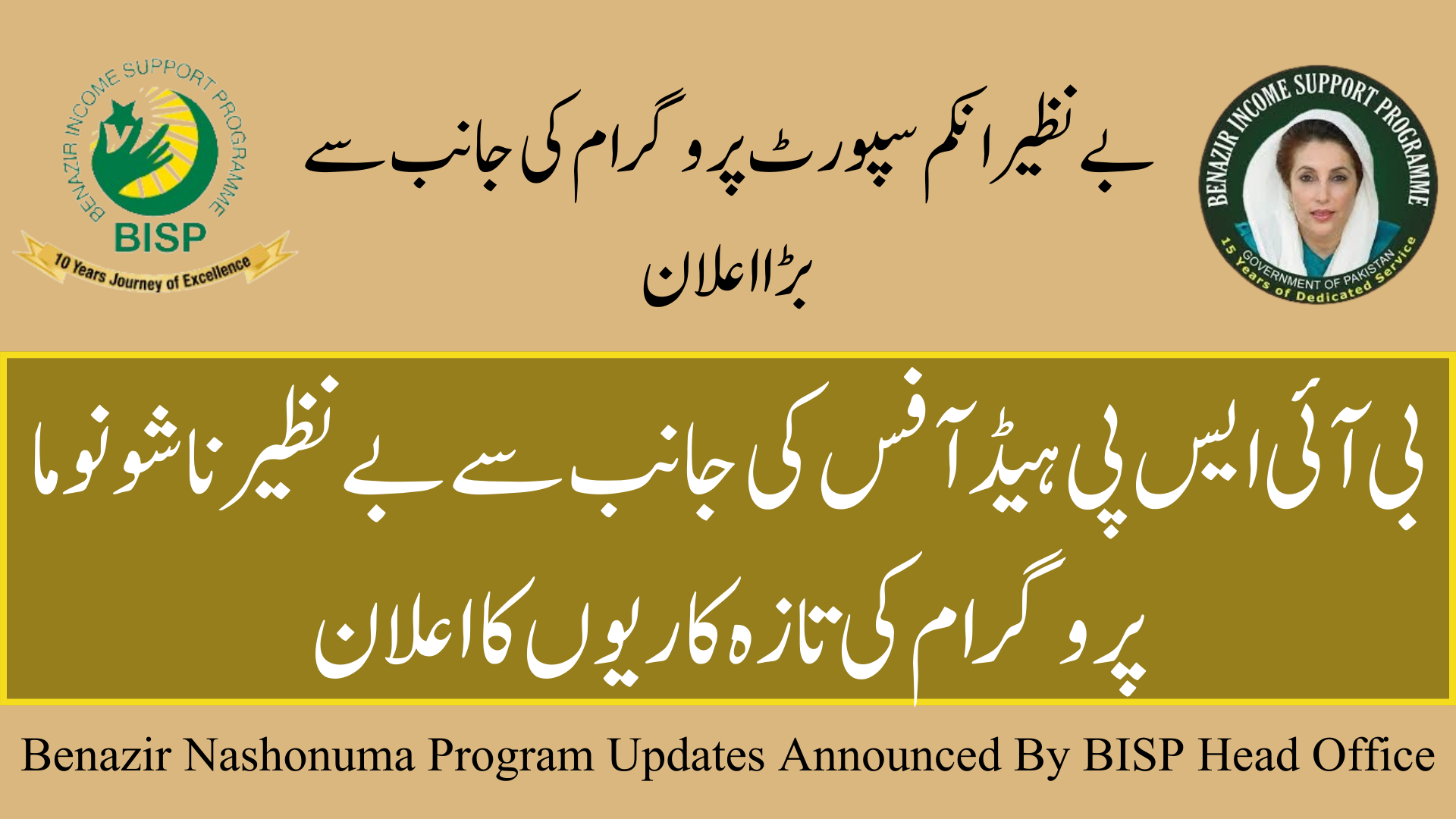Benazir Nashonuma Program Updates Announced By BISP Head Office
The Benazir Nashonuma Program is a vital initiative launched by the Pakistani government in August 2020. It aims to permanently eradicate stunting among pregnant and lactating women (PLW) and children under the age of two. This conditional cash transfer program was started in collaboration with the World Food Program (WFP) and the Benazir Income Support Program (BISP), and has achieved significant progress in combating malnutrition and enhancing maternal and child health throughout Pakistan.
Benazir Nashonuma Program
The program operates on a straightforward principle: qualified mothers receive additional financial support on the condition that they regularly participate in gestation health screenings and awareness events, consume specific nutritious food (SNF), and adhere to vaccination schedules. This support amounts to PKR 2,000 per half-year for pregnant women and PKR 2,500 per quarter for female children, thereby enhancing the existing benefits available within the BISP system.
Inception and Collaboration
Launched under the BISP, the Benazir Nashonuma Program aims to tackle malnutrition and improve maternal and child health by partnering with the WFP. This collaboration leverages the WFP’s expertise in food assistance and nutrition programs for effective implementation and outreach, combining resources and knowledge to better address the needs of vulnerable populations.
Implementation Process
The program’s success is attributed to its inclusive approach, targeting pregnant women and children under two years old. Enrollment requires registration with the BISP and compliance with the program’s conditions. Payments are made quarterly, with additional provisions for transportation expenses to ensure that beneficiaries can access necessary services.
Benefits and Impact
The Benazir Nashonuma Program not only provides financial assistance but also promotes regular health check-ups, maternal nutrition, and healthcare access, thereby enhancing health outcomes for mothers and children. By addressing the root causes of stunting, the program lays the groundwork for long-term developmental improvements, contributing to overall better health and development in the community.
READ MORE: 8800 Code for Roshan Gharana Scheme Issued By Government
Application Process for BISP and Nashonuma
Eligible individuals can apply online via the official BISP website. The application process ensures transparency in eligibility criteria, including income thresholds and citizenship requirements, making it accessible and straightforward for potential beneficiaries.
Steps to Apply for BISP Online
Registration: Visit the official BISP website and register.
Verification: Submit necessary documents for income and citizenship verification.
Approval: Eligible candidates will be notified and registered for the program.
Latest Updates and Future Prospects
As of July 2024, the Benazir Nashonuma Program operates in 45 districts and has reached over 1.1 million beneficiaries. Increased government assistance reflects the program’s ongoing commitment to addressing malnutrition and maternal/child health issues. Continued expansion and adaptation of the program are expected to further enhance its impact.
Conclusion
The Benazir Nashonuma Program represents a significant advancement in the government’s efforts to combat poverty and improve the health of mothers and children. By using financial transfers as a catalyst for behavioral changes and improved healthcare access, the program has immense potential for achieving long-term developmental goals. Moving forward, concerted efforts to resolve implementation challenges and expand the program’s scope are critical for ensuring its continued success.
FAQs
Q1: What is the Benazir Nashonuma Program, and what are its key desired outcomes?
A1: The Benazir Nashonuma Program, started in August 2020, aims to eliminate stunting among pregnant and lactating women (PLW) and children under the age of two. It provides monetary support to improve the health of mothers and their babies, with participants required to undergo health exams, consume specified nutritious foods, and fulfill immunization schedules.
Q2: How can eligible individuals apply for the BISP and Benazir Nashonuma Programs online?
A2: Potential candidates can submit their applications online at the official BISP website. The electronic registration strategy improves accessibility by establishing explicit standards for eligibility, which include income limits and prerequisites for citizenship, making it simple for recipients to evaluate their candidacy.
Q3: What are the benefits of the Benazir Nashonuma Program?
A3: The program provides aid worth PKR 2,000 per half-year for pregnant women and PKR 2,500 per quarter for female children. It supports frequent health evaluations, nutrition during pregnancy, and access to healthcare for mothers and children while addressing the root causes of stunting.
Q4: What is the duration of the Benazir Nashonuma Program’s financial support for pregnant women and children?
A4: Pregnant women receive financial support of PKR 2,000 per half-year, while female children receive PKR 2,500 per quarter.
Q5: How does the Benazir Nashonuma Program collaborate with the WFP?
A5: The program partners with the World Food Program to leverage its expertise in food assistance and nutrition programs, enhancing the effectiveness of its implementation and outreach efforts.
Q6: What conditions must be met to receive support from the Benazir Nashonuma Program?
A6: To receive support, participants must regularly attend gestation health screenings, consume specific nutritious foods (SNF), and adhere to vaccination schedules.
Q7: How often are payments made under the Benazir Nashonuma Program?
A7: Payments are made quarterly, with additional provisions for transportation expenses to facilitate access to necessary services.
Q8: What steps are involved in the application process for the Benazir Nashonuma Program?
A8: Applicants must register on the official BISP website, submit documents for income and citizenship verification, and await approval notification.
Q9: How many districts are currently covered by the Benazir Nashonuma Program?
A9: As of July 2024, the program operates in 45 districts.
Q10: What are the future prospects for the Benazir Nashonuma Program?
A10: The program is expected to continue expanding and adapting to further address malnutrition and maternal/child health issues, with increased government assistance reflecting its ongoing commitment.
ALSO READ: Ehsaas Ration Subsidy Announced Updates for Eligible People


